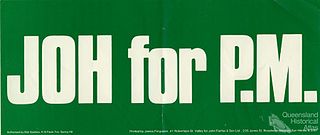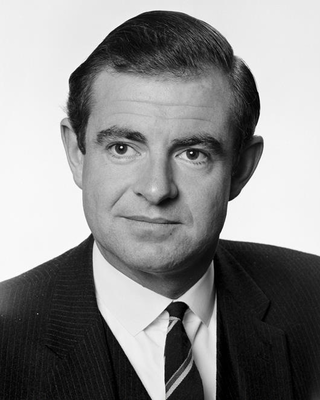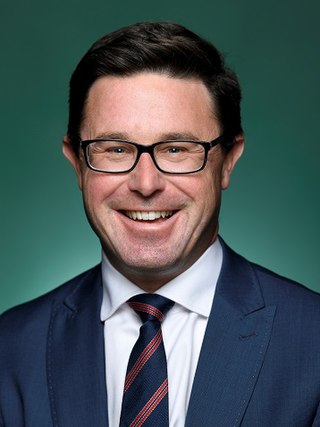Politics
McVeigh won the seat of Darling Downs for the National Country Party at the 1972 election. He was appointed Minister for Housing and Construction in the Fraser government in November 1980. In May 1982,he was moved to the portfolio of Minister for Home Affairs and the Environment and held that position to the defeat of the government at the 1983 election. In 1984,with the abolition of the seat of Darling Downs,McVeigh followed most of his constituents into the new Division of Groom,which he held until his resignation in February 1988. [1]
McVeigh aligned himself with Queensland premier Joh Bjelke-Petersen's "Joh for Canberra" campaign in 1987,which sparked a fracture in the Nationals between Queensland MPs seeking an independent National Party and supporters of federal leader Ian Sinclair and the existing coalition with the Liberals. He was the first Nationals MP to withdraw from the Coalition,doing so at a party meeting on 17 March. [4] McVeigh nonetheless remained a Nationals frontbencher during this time,serving as the party's spokesman on Aboriginal affairs. [1] He eventually rejoined the Coalition on 11 August. [5]
In December 1987,it was reported that the Queensland state government had nominated McVeigh to serve as agent-general in London. [6] He formally resigned from parliament on 29 February 1988,sparking a by-election in Groom. [7]
The National Party of Australia, commonly known as the Nationals or simply the Nats, is a centre-right and agrarian political party in Australia. Traditionally representing graziers, farmers, and rural voters generally, it began as the Australian Country Party in 1920 at a federal level.

Sir Johannes Bjelke-Petersen was an Australian politician. He was the longest-serving premier of Queensland, holding office from 1968 to 1987 as state leader of the National Party.

John Douglas Anthony was an Australian politician. He served as leader of the National Party of Australia from 1971 to 1984 and was the second and longest-serving deputy prime minister, holding the position under John Gorton (1971), William McMahon (1971–1972) and Malcolm Fraser (1975–1983).

Ian McCahon Sinclair is an Australian former politician who served as a Member of Parliament for 35 years, and was leader of the National Party from 1984 to 1989. He served as either a minister or opposition frontbencher for all but a few months from 1965 to 1989, and later Speaker of the House of Representatives from March to August 1998.

The Joh for Canberra campaign, initially known as the Joh for PM campaign, was an attempt by Queensland National Party premier Sir Joh Bjelke-Petersen to become Prime Minister of Australia. The campaign was announced in January 1987 and drew substantial support from Queensland businessmen and some conservative politicians. The campaign caused a split in the federal Coalition. It did not attract widespread support and collapsed in June 1987. The Australian Labor Party, led by Bob Hawke, went on to win the 1987 federal election with an increased majority, gaining its highest-ever number of seats. Bjelke-Petersen came under increasing scrutiny as the Fitzgerald Inquiry gained traction, and was forced out of politics altogether in December 1987.

Ronald Leslie Doyle Boswell is a former Australian politician. He was a Senator for Queensland from 1983 to 2014, representing the National Party. He was the party's Senate leader from 1990 to 2007, a record term. He was also a parliamentary secretary in the Howard government from 1999 to 2003. He was Father of the Senate from 2008 until his retirement in 2014.
Commodore William Leonard Taylor, is a former Australian naval officer and politician. He was a senior officer in the Royal Australian Navy, resigning to run for federal parliament. He represented the Liberal Party in the House of Representatives from 1988 to 1998, holding the Queensland seat of Groom. He later served as administrator of the Australian Indian Ocean Territories from 1999 to 2003.

Sir Littleton Ernest Groom KCMG KC was an Australian politician. He held ministerial office under four prime ministers between 1905 and 1925, and subsequently served as Speaker of the House of Representatives from 1926 to 1929.

The 1987 Australian federal election was held in Australia on 11 July 1987, following the granting of a double dissolution on 5 June by the Governor-General Sir Ninian Stephen. Consequently, all 148 seats in the House of Representatives as well as all 76 seats in the Senate were up for election. The incumbent Australian Labor Party, led by Prime Minister Bob Hawke, defeated the opposition Liberal Party of Australia, led by John Howard and the National Party of Australia led by Ian Sinclair. This was the first, and to date only, time the Labor Party won a third consecutive election.

Neil Anthony Brown is an Australian former politician. He was deputy leader of the Liberal Party and deputy opposition leader from 1985 to 1987, under John Howard. He served as Minister for Employment and Youth Affairs (1981–1982) and Minister for Communications (1982–1983) in the Fraser government.

William Angus Manson Gunn AM was an Australian politician who represented the Queensland Legislative Assembly seat of Somerset from 1972 until 1992. A member of the National Party, he also served as a Minister and Deputy Premier in various Queensland administrations during the 1980s, and was instrumental in establishing the Fitzgerald Inquiry.
A political family of Australia is a family in which multiple members are involved in Australian politics, particularly electoral politics. Members may be related by blood or marriage; often several generations or multiple siblings may be involved.
John Charles Hodges was an Australian politician. A member of the Liberal Party, he served as Minister for Immigration and Ethnic Affairs in the Fraser government from 1982 to 1983. He was a member of the House of Representatives from 1974 to 1983 and from 1984 to 1987, representing the Queensland seat of Petrie.
Ian Milne Dixon Cameron is an Australian politician. He was a National Country Party member of the Australian House of Representatives, representing the electorate of Maranoa.
Stanley James Collard is a former Australian politician. He was a Senator for Queensland from 1975 to 1987, representing the National Party. He was elected as the party's Senate leader in 1985, but failed to win National Party preselection prior to the 1987 federal election owing to his opposition to the "Joh for Canberra" movement. He was a locomotive engine driver with Queensland Railways and trade unionist before his election to the Senate.
This article provides information on candidates who stood for the 1984 Australian federal election. The election was held on 1 December 1984.

A by-election was held for the Australian House of Representatives seat of Groom on 9 April 1988. It was triggered by the resignation of National Party MP Tom McVeigh.

John Joseph McVeigh is an Australian former politician. He was elected to the House of Representatives at the 2016 federal election, representing the Division of Groom. He was a member of the Liberal National Party of Queensland and sat in the Liberal party room. During the Turnbull government he served in cabinet as Minister for Regional Development, Territories and Local Government from 2017 to 2018. He previously served in the Legislative Assembly of Queensland from 2012 to 2016 and was Minister for Agriculture, Fisheries and Forestry under Premier Campbell Newman.

David Kelly Littleproud is an Australian politician who has been the leader of the National Party since May 2022. He has represented the Queensland seat of Maranoa since the 2016 federal election and was a cabinet minister in the Turnbull and Morrison governments.

The 2020 Groom by-election was held on 28 November 2020 to elect the next Member of Parliament for the division of Groom in the House of Representatives. The by-election was triggered following the resignation of incumbent Liberal National MP John McVeigh on 18 September 2020.













